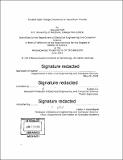Tunable spin-charge conversion in vanadium dioxide
Author(s)
Safi, Taqiyyah(Taqiyyah Sariyah)
Download1124958003-MIT.pdf (5.957Mb)
Other Contributors
Massachusetts Institute of Technology. Department of Electrical Engineering and Computer Science.
Advisor
Luqiao Liu.
Terms of use
Metadata
Show full item recordAbstract
Spin-based electronic devices rely on the interplay of spin and charge degree of freedom of electrons and are emerging as a promising beyond CMOS technology. Fast, scalable, low energy consumption magnetic memories and nonvolatile spin logic devices have been demonstrated utilizing spin-orbit-torque based magnetization switching. A large, pure spin current is crucial for these applications and significant effort is geared towards finding materials with large charge-to-spin conversion efficiency to exploit the full potential of spintronics. The charge-to-spin conversion efficiency is an inherent property of the spintronics materials and cannot be easily modified without changing the chemical or structural properties of the material. To date most of the explored materials, have significant electrical conductivity and are in their pure, stable, intrinsic structural form. Most importantly, they exhibit negligible variation in the electrical and structural properties. In this thesis we investigate spin-charge conversion efficiency in the transition metal oxide, vanadium dioxide (VO₂), which exhibits structural phase transition subject to external stimuli. We demonstrate tunable charge-to-spin conversions in this material across the phase transition. Vanadium dioxide is a prototypical metal-insulator transition material and has the unique property of a dramatic and abrupt structural phase transition under external stimuli such as heat, strain, and electric field etc. Due to its unique properties, it has gained much interest from both fundamental research and applications perspective but its spin related properties remain largely unexplored. In this thesis, we demonstrate the successful tuning of charge-spin conversion efficiency via the metal-insulator transition in this quintessential strongly correlated electron compound. We inject a pure spin current through ferromagnetic resonance driven spin pumping and measure the temperature dependent inverse spin Hall effect voltage across VO₂ We found a swift, dramatic change in the spin pumping signal (decrease by >80%) and charge-spin conversion efficiency (increase by five times) upon transition. The swift, dramatic change in the structural and electrical properties of this material therefore provides additional knobs to modulate the conversion efficiency. This work leads to extra flexibilities in spintronic device design and opens up new avenues for variable spintronics.
Description
Thesis: S.M., Massachusetts Institute of Technology, Department of Electrical Engineering and Computer Science, 2019 Cataloged from PDF version of thesis. Includes bibliographical references (pages 52-58).
Date issued
2019Department
Massachusetts Institute of Technology. Department of Electrical Engineering and Computer SciencePublisher
Massachusetts Institute of Technology
Keywords
Electrical Engineering and Computer Science.